GE
-
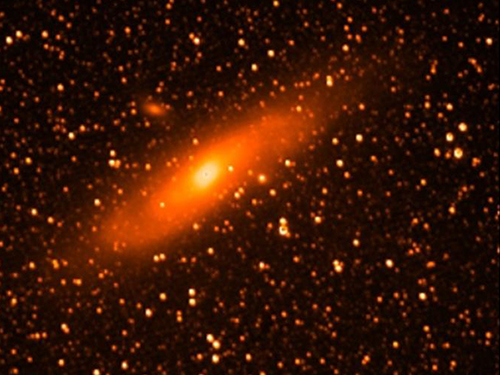 Space Observatory Video by Science & Technology Satellite No. 3 Released
Images of the Andromeda Galaxy, the Orion Nebula, and the Rosetta Nebula taken by the Science & Technology Satellite No. 3, which was built by the KAIST Satellite Technology Research Center and launched at the Yasny launch site in Russia, were released on December 17, 21 st and 22 nd , 2013.
The Andromeda Galaxy (M31) is the nearest spiral galaxy and is located about two million light years away from the earth. The first image received was an infrared image recorded by the space telescope loaded in the satellite.
Research using the satellite’s infrared camera and imaging spectrometer for observing the Earth will also be conducted until February, 2014. After that, the satellite will be collecting images on infrared cosmic background radiation and exploring the galactic plane at a height of 600 km for two years. The infrared and spectrometer images from the Earth observation can be utilized for disaster monitoring and applied to basic research for the detection of wildfires and urban heat island effect as well as flood damage observation and water quality prediction.
Infrared Light Observed in the Universe, Andromeda Galaxy
2014.01.13 View 8834
Space Observatory Video by Science & Technology Satellite No. 3 Released
Images of the Andromeda Galaxy, the Orion Nebula, and the Rosetta Nebula taken by the Science & Technology Satellite No. 3, which was built by the KAIST Satellite Technology Research Center and launched at the Yasny launch site in Russia, were released on December 17, 21 st and 22 nd , 2013.
The Andromeda Galaxy (M31) is the nearest spiral galaxy and is located about two million light years away from the earth. The first image received was an infrared image recorded by the space telescope loaded in the satellite.
Research using the satellite’s infrared camera and imaging spectrometer for observing the Earth will also be conducted until February, 2014. After that, the satellite will be collecting images on infrared cosmic background radiation and exploring the galactic plane at a height of 600 km for two years. The infrared and spectrometer images from the Earth observation can be utilized for disaster monitoring and applied to basic research for the detection of wildfires and urban heat island effect as well as flood damage observation and water quality prediction.
Infrared Light Observed in the Universe, Andromeda Galaxy
2014.01.13 View 8834 -
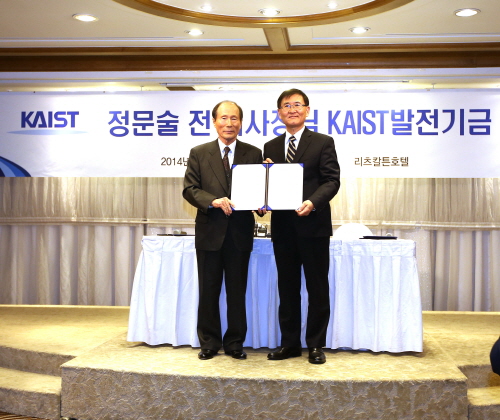 KAIST receives $20 million donation for futures studies
A retired businessman, Moon-Soul Chung, the former chief executive officer of Mirae, Inc., a semiconductor equipment company in Korea, today donated USD 20 million to the Graduate School of Future Strategy at KAIST.
It was Chung's second contribution to KAIST—his first donation of USD 28 million in 2001 supported the construction of the Bio and Brain Engineering building, a major research center on campus where biotechnology and information technology converge.
Established in 2013, the KAIST Graduate School of Future Strategy consists of three interdisciplinary graduate programs on future strategy, intellectual property, and science journalism. The Research Center for Future Strategy is an affiliate of the graduate school. KAIST is the first Korean university that offers an academic program granting a degree in futures studies.
The rapid advancement in science and technology today affects, profoundly and extensively, all corners of global society from education, politics, economy, and environment to resources, sustainability, and inequality. As we live in a highly interconnected, digitalized, and unpredictable world, analyzing the events, trends, patterns, and changes of the past and present, developing foresight, and mapping preferred futures have become more relevant than ever.
KAIST utilizes its strong tech-knowledge base in science and engineering to offer students a high quality education and training in futures thinking, skills, and methodologies to develop foresight and to plan future strategies for international relations, business and industry, national defense, science and technology, and new media. KAIST also anticipates helping government, business, public service, and non-profit organizations identify important issues and develop long-range implementation strategies to prepare for probable and preferred futures.
Moon-Soul Chung (left), the former CEO of Mirae Inc., and President Steve Kang (right), holding together the donation agreement in Seoul, January 10th, 2014
2014.01.13 View 8668
KAIST receives $20 million donation for futures studies
A retired businessman, Moon-Soul Chung, the former chief executive officer of Mirae, Inc., a semiconductor equipment company in Korea, today donated USD 20 million to the Graduate School of Future Strategy at KAIST.
It was Chung's second contribution to KAIST—his first donation of USD 28 million in 2001 supported the construction of the Bio and Brain Engineering building, a major research center on campus where biotechnology and information technology converge.
Established in 2013, the KAIST Graduate School of Future Strategy consists of three interdisciplinary graduate programs on future strategy, intellectual property, and science journalism. The Research Center for Future Strategy is an affiliate of the graduate school. KAIST is the first Korean university that offers an academic program granting a degree in futures studies.
The rapid advancement in science and technology today affects, profoundly and extensively, all corners of global society from education, politics, economy, and environment to resources, sustainability, and inequality. As we live in a highly interconnected, digitalized, and unpredictable world, analyzing the events, trends, patterns, and changes of the past and present, developing foresight, and mapping preferred futures have become more relevant than ever.
KAIST utilizes its strong tech-knowledge base in science and engineering to offer students a high quality education and training in futures thinking, skills, and methodologies to develop foresight and to plan future strategies for international relations, business and industry, national defense, science and technology, and new media. KAIST also anticipates helping government, business, public service, and non-profit organizations identify important issues and develop long-range implementation strategies to prepare for probable and preferred futures.
Moon-Soul Chung (left), the former CEO of Mirae Inc., and President Steve Kang (right), holding together the donation agreement in Seoul, January 10th, 2014
2014.01.13 View 8668 -
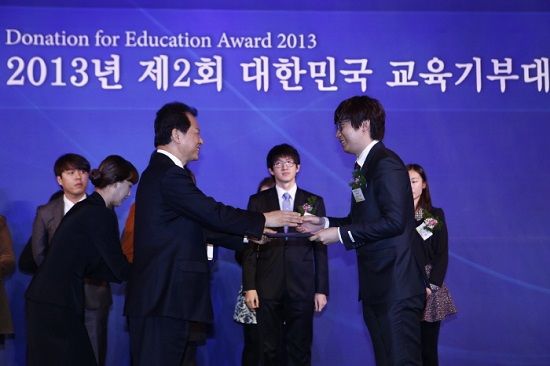 An Education Donation Club at KAIST Received the Education Minister's Award in 2013
Chalk, one of the student clubs at KAIST, shares knowledge by providing free online classes to teenage students in Korea via Internet.
Chalk, a KAIST student club which donates their educational knowledge, received an award from the Education Minister of the Republic of Korea at the 2nd Donation for Education Award held on December 16th, 2013 at the Plaza Hotel in Seoul.
The Donation for Eduation Award aims to find and reward corporations, organizations, and individuals, which have actively contributed to growing the dreams and talents of students, as well as revitalizing the culture of donation for education. It has been awarded by the Ministry of Education since 2012 to promote the awareness and participation of students for education.
Chalk provides free online video lectures on www.playchalk.com and runs a mentoring-based education program. The club has been recognized for offering online courses, math and science classes in particular, to teenage students who are from socially and economically less privileged backgrounds.
Chalk was founded by five KAIST students in 2011. Their ultimate goal is to create a society where students can fully enjoy the benefits of education, regardless of their economic conditions. About 60 undergraduate students currently participate in the club, with more than 5,000 students attending over 160 lectures without any cost.
2014.01.07 View 9960
An Education Donation Club at KAIST Received the Education Minister's Award in 2013
Chalk, one of the student clubs at KAIST, shares knowledge by providing free online classes to teenage students in Korea via Internet.
Chalk, a KAIST student club which donates their educational knowledge, received an award from the Education Minister of the Republic of Korea at the 2nd Donation for Education Award held on December 16th, 2013 at the Plaza Hotel in Seoul.
The Donation for Eduation Award aims to find and reward corporations, organizations, and individuals, which have actively contributed to growing the dreams and talents of students, as well as revitalizing the culture of donation for education. It has been awarded by the Ministry of Education since 2012 to promote the awareness and participation of students for education.
Chalk provides free online video lectures on www.playchalk.com and runs a mentoring-based education program. The club has been recognized for offering online courses, math and science classes in particular, to teenage students who are from socially and economically less privileged backgrounds.
Chalk was founded by five KAIST students in 2011. Their ultimate goal is to create a society where students can fully enjoy the benefits of education, regardless of their economic conditions. About 60 undergraduate students currently participate in the club, with more than 5,000 students attending over 160 lectures without any cost.
2014.01.07 View 9960 -
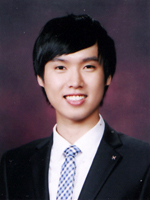 KAIST Student Awarded Prize from Energy Saving Contest
Jun-Min Kwon, an undergraduate student in the Department of Chemistry at KAIST, was awarded a prize from the Ministry of Trade, Industry and Energy, Republic of Korea, at the 35th Energy Saving Contest which was held on November 20.
The student club he has been leading was also selected as one of the best groups by the Save Energy Save Earth (SESE), a volunteer organization supported by the Korea Energy Management Corporation and the Ministry of Knowledge Economy, Republic of Korea.
Kwon began promoting energy conservation through a blog and participated in related meetings and workshops as a high school student to improve the understanding on the importance of energy saving and recycling.He also received awards from the Second National Assembly Forum on Climate Change, the Korean National Science Fair, as well as the Samsung Human Tech Paper Award.
2013.12.24 View 12843
KAIST Student Awarded Prize from Energy Saving Contest
Jun-Min Kwon, an undergraduate student in the Department of Chemistry at KAIST, was awarded a prize from the Ministry of Trade, Industry and Energy, Republic of Korea, at the 35th Energy Saving Contest which was held on November 20.
The student club he has been leading was also selected as one of the best groups by the Save Energy Save Earth (SESE), a volunteer organization supported by the Korea Energy Management Corporation and the Ministry of Knowledge Economy, Republic of Korea.
Kwon began promoting energy conservation through a blog and participated in related meetings and workshops as a high school student to improve the understanding on the importance of energy saving and recycling.He also received awards from the Second National Assembly Forum on Climate Change, the Korean National Science Fair, as well as the Samsung Human Tech Paper Award.
2013.12.24 View 12843 -
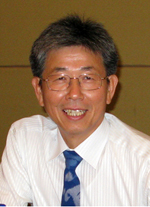 Professor Suk-Joo Na Invited to Finland as Distinguished Professor
Professor Suk-Joo Na, from the Department of Mechanical Engineering at KAIST, has been invited as a distinguished professor for an international research project in Finland.
As a leading scientist in the field of arc welding and numerical analysis of the laser welding process, Na will assemble a research group for the interpretation of the welding processes for three years at the VVT Technical Research Centre of Finland beginning in January of 2014.
The project was established to improve the research level and national competitiveness of Finland by inviting leading international scientists to the National Technology Agency of Finland and Academy of Finland since 2006 and over one hundred projects have been carried out thus far. A total of 17 billion won will be invested for the eleven new projects selected this year. Professor Na said, “The fusion welding field contains important technology for improving the competitiveness of mechanical products of Finland. Improvements in productivity, the life cycles of products, and energy saving through interpretation technology for the numerical analysis of the welding process will make a huge impact on the national economy of Finland.”
2013.12.24 View 9866
Professor Suk-Joo Na Invited to Finland as Distinguished Professor
Professor Suk-Joo Na, from the Department of Mechanical Engineering at KAIST, has been invited as a distinguished professor for an international research project in Finland.
As a leading scientist in the field of arc welding and numerical analysis of the laser welding process, Na will assemble a research group for the interpretation of the welding processes for three years at the VVT Technical Research Centre of Finland beginning in January of 2014.
The project was established to improve the research level and national competitiveness of Finland by inviting leading international scientists to the National Technology Agency of Finland and Academy of Finland since 2006 and over one hundred projects have been carried out thus far. A total of 17 billion won will be invested for the eleven new projects selected this year. Professor Na said, “The fusion welding field contains important technology for improving the competitiveness of mechanical products of Finland. Improvements in productivity, the life cycles of products, and energy saving through interpretation technology for the numerical analysis of the welding process will make a huge impact on the national economy of Finland.”
2013.12.24 View 9866 -
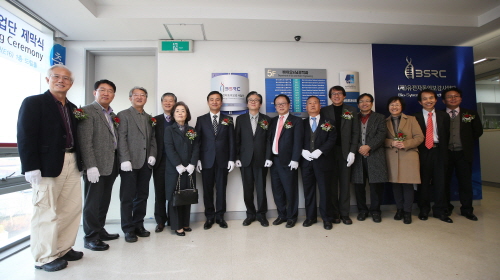 Opening Ceremony of Genetic Donguibogam held
- Medicine using traditional natural substances • Food product source technology development begins
- Over 150,000,000,000 Won for 10 years of work invested to develop source technology
- Opening ceremony held on November 26th at 3 p.m. in Bio & Brain Engineering Division Building
The research to develop medicine and food source technology using traditional natural substances hasbegun.The opening ceremony of the “Genetic Donguibogam” business group, with KAIST Department of Bio & Brain Engineering Professor Do Heon Lee as the leader, was held on November 26th at 3 p.m. in Dream Hall, Bio & Brain Engineering Division Building, KAIST, Daejeon. The attendees of the opening ceremony included Yo Eop Im, Head of the Future Technology Department of the Ministry of Science, ICT and Future Planning and around 200 experts in science and technology industry, including the National Research Foundation of Korea, KAIST, the Korea Institute of Science and Technology, Seoul National University and Yonsei University.
The business group was established to re-interpret traditional natural substances proved to be effective from experience and improve quality of life by researching its applications; and to develop integrated source technology using traditional natural substances. The group is to invest over 150,000,000,000 Won for 10 years of research to secure natural substance source technology in five stages: interpretation technology, analysis technology, verification technology, bio marker technology and human body effectiveness verification technology. Especially, the focus would be on the use of virtual body computer models and Omics* to analyse the effects of traditional natural substances mixture on human body, and to find new materials for healthcare.
This research model, it is hoped, will have a new item to pioneer in the world natural substance market as well as securing a technologically competitive edge in bio industry by developing source technology that investigates the effects of traditional natural substances using cutting edge science.
KAIST Department of Bio & Brain Engineering Professor and Head Do Heon Lee of the “Genetic Donguibogam” Business Group said, “We will push forward to develop source energy by integrating IT-BT technology with a computer virtual body to build a cooperation system with medicine and functional food industries.” He continued: “This will enable not only the creation of a new industry, but also customised medicine.”
The 12 partners of the group include KAIST, Korea Institute of Science and Technology, Seoul National University and Yonsei University and 200 experts. The research participation area will be widened to foreign research institutes and associated companies.
* Terminology
Noun) Omics is an academic discipline analysing mass information on metabolism of physiological phenomena in specific cells (transcriptome, proteome and protoplast) with an integrated approach to determine vital phenomena.
2013.12.11 View 9631
Opening Ceremony of Genetic Donguibogam held
- Medicine using traditional natural substances • Food product source technology development begins
- Over 150,000,000,000 Won for 10 years of work invested to develop source technology
- Opening ceremony held on November 26th at 3 p.m. in Bio & Brain Engineering Division Building
The research to develop medicine and food source technology using traditional natural substances hasbegun.The opening ceremony of the “Genetic Donguibogam” business group, with KAIST Department of Bio & Brain Engineering Professor Do Heon Lee as the leader, was held on November 26th at 3 p.m. in Dream Hall, Bio & Brain Engineering Division Building, KAIST, Daejeon. The attendees of the opening ceremony included Yo Eop Im, Head of the Future Technology Department of the Ministry of Science, ICT and Future Planning and around 200 experts in science and technology industry, including the National Research Foundation of Korea, KAIST, the Korea Institute of Science and Technology, Seoul National University and Yonsei University.
The business group was established to re-interpret traditional natural substances proved to be effective from experience and improve quality of life by researching its applications; and to develop integrated source technology using traditional natural substances. The group is to invest over 150,000,000,000 Won for 10 years of research to secure natural substance source technology in five stages: interpretation technology, analysis technology, verification technology, bio marker technology and human body effectiveness verification technology. Especially, the focus would be on the use of virtual body computer models and Omics* to analyse the effects of traditional natural substances mixture on human body, and to find new materials for healthcare.
This research model, it is hoped, will have a new item to pioneer in the world natural substance market as well as securing a technologically competitive edge in bio industry by developing source technology that investigates the effects of traditional natural substances using cutting edge science.
KAIST Department of Bio & Brain Engineering Professor and Head Do Heon Lee of the “Genetic Donguibogam” Business Group said, “We will push forward to develop source energy by integrating IT-BT technology with a computer virtual body to build a cooperation system with medicine and functional food industries.” He continued: “This will enable not only the creation of a new industry, but also customised medicine.”
The 12 partners of the group include KAIST, Korea Institute of Science and Technology, Seoul National University and Yonsei University and 200 experts. The research participation area will be widened to foreign research institutes and associated companies.
* Terminology
Noun) Omics is an academic discipline analysing mass information on metabolism of physiological phenomena in specific cells (transcriptome, proteome and protoplast) with an integrated approach to determine vital phenomena.
2013.12.11 View 9631 -
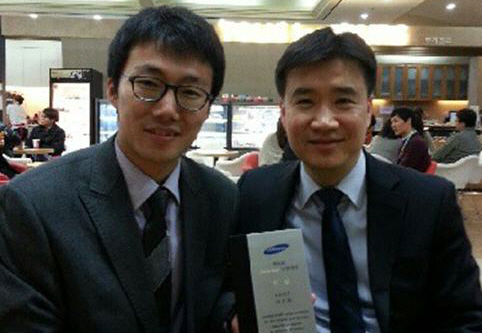 Graduate Student at KAIST Awarded Best Prize at the 9th Inside Edge
Sun-Jin Choi, a Ph. D. candidate in the Department of Materials Science and Engineering at KAIST, under the guidance of Professor Il-Doo Kim, won the best prize at the 9th Inside Edge Contest hosted by Samsung Electro-Mechanics.
Choi was awarded prize money totaling fifteen million won at the award ceremony held on November 22 at the Mirae Hall at the headquarters of Samsung Electro-Mechanics in Suwon.
Choi’s research, titled “Exhaled Breath Sensor Arrays for the Non-invasive and Real-time Diagnosis of Diabetes by Detection of Acetone,” was recognized for its creativity and uniqueness.The Inside Edge is an international thesis competition which was started in 2005 to encourage and support creative research and potential technological development among young scientists and engineers.
Sun-Jin Choi (left) and Professor Il-Doo Kim (right).
2013.12.11 View 9921
Graduate Student at KAIST Awarded Best Prize at the 9th Inside Edge
Sun-Jin Choi, a Ph. D. candidate in the Department of Materials Science and Engineering at KAIST, under the guidance of Professor Il-Doo Kim, won the best prize at the 9th Inside Edge Contest hosted by Samsung Electro-Mechanics.
Choi was awarded prize money totaling fifteen million won at the award ceremony held on November 22 at the Mirae Hall at the headquarters of Samsung Electro-Mechanics in Suwon.
Choi’s research, titled “Exhaled Breath Sensor Arrays for the Non-invasive and Real-time Diagnosis of Diabetes by Detection of Acetone,” was recognized for its creativity and uniqueness.The Inside Edge is an international thesis competition which was started in 2005 to encourage and support creative research and potential technological development among young scientists and engineers.
Sun-Jin Choi (left) and Professor Il-Doo Kim (right).
2013.12.11 View 9921 -
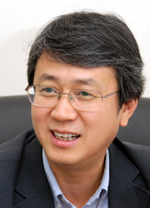 Rechargeable Lithium Sulfur Battery for Greater Battery Capacity
Professor Do Kyung Kim from the Department of Material Science and Engineering and Professor Jang Wook Choi from the Graduate School of EEWS have been featured in the lead story of the renowned nanoscience journal Advanced Materials for their research on the lithium sulfur battery. This new type of battery developed by Professor Kim is expected to have a longer life battery life and [higher] energy density than currently commercial batteries.
With ample energy density up to 2100Wh/kg—almost 5.4 times that of lithium ion batteries—lithium sulfur batteries can withstand the sharp decrease in energy capacity resulting from charging and discharging—which has been considered the inherent limitation of the conventional batteries.
Professor Kim and his research team used one-dimensional, vertical alignment of 75nm tick, 15μm long sulfur nanowires to maximize electric conductivity. Then, to prevent loss of battery life, they carbon-coated each nanowire and prohibited direct contact between the sulfur and electrolyte.
The result was one of the most powerful batteries in terms of both energy performance and density. Compared to conventional batteries which suffer from continuous decrease in energy capacity after being discharged, the lithium sulfur battery maintained 99.2% of its initial capacity after being charged and discharged 300 times and up to 70% even after 1000 times.
Professor Kim claims that his new battery is an important step forward towards a high-performance rechargeable battery which is a vital technology for unmanned vehicles, electric automobiles and energy storage. He hopes that his research can solve the problems of battery-capacity loss and contribute to South Korea’s leading position in battery technology. Professor Kim’s research team has filed applications for one domestic and international patent for their research.
2013.12.11 View 12773
Rechargeable Lithium Sulfur Battery for Greater Battery Capacity
Professor Do Kyung Kim from the Department of Material Science and Engineering and Professor Jang Wook Choi from the Graduate School of EEWS have been featured in the lead story of the renowned nanoscience journal Advanced Materials for their research on the lithium sulfur battery. This new type of battery developed by Professor Kim is expected to have a longer life battery life and [higher] energy density than currently commercial batteries.
With ample energy density up to 2100Wh/kg—almost 5.4 times that of lithium ion batteries—lithium sulfur batteries can withstand the sharp decrease in energy capacity resulting from charging and discharging—which has been considered the inherent limitation of the conventional batteries.
Professor Kim and his research team used one-dimensional, vertical alignment of 75nm tick, 15μm long sulfur nanowires to maximize electric conductivity. Then, to prevent loss of battery life, they carbon-coated each nanowire and prohibited direct contact between the sulfur and electrolyte.
The result was one of the most powerful batteries in terms of both energy performance and density. Compared to conventional batteries which suffer from continuous decrease in energy capacity after being discharged, the lithium sulfur battery maintained 99.2% of its initial capacity after being charged and discharged 300 times and up to 70% even after 1000 times.
Professor Kim claims that his new battery is an important step forward towards a high-performance rechargeable battery which is a vital technology for unmanned vehicles, electric automobiles and energy storage. He hopes that his research can solve the problems of battery-capacity loss and contribute to South Korea’s leading position in battery technology. Professor Kim’s research team has filed applications for one domestic and international patent for their research.
2013.12.11 View 12773 -
 Wearable computer follows suit of smart phones
KAIST hosts “Wearable Computer Competition” in KI Building, Daejeon Campus, on the 7th-8th of November
“Computer that controls smart phones with the movement of facial muscles” and 12 other wearable computers to be presented
As technology transitions to “Wearable Computers,” KAIST is hosting its 9th “Wearable Computer Competition.” The competition will take place over two days, 7th-8th of November, in KI building, on the main Daejeon Campus.
The “wearable computer” is designed to enable users to use the computer whilst moving by limiting its weight and size so that it can be worn as a part of the body and clothing. Wearable computers have been considered the future of information technology (IT) ever since smart phones and other miniaturized IT devices made an appearance.
The “Wearable Computer Competition” has been held since 2005 under the leadership of Professor Hoi-Jun Yoo from the KAIST Department of Electrical Engineering. It is the only competition in the nation where undergraduate students use their unique ideas and newest technology to produce computers that seem to be existed only in sci-fi movies and comic books.
A total of 15 teams out of 70 made the competition and went through a rigorous selection process based on written applications and interviews to enter the final. The teams at the final received USD 1,400 and IT devices including smart phones to produce a wearable computer.
KAIST increased the number of finalists from the last year"s 10 to 15 this year as the wearable computer industry is extending, and there is growing interest in the computer around the world after the launch of Google Glass and Samsung Galaxy Gear.
This year’s entries included a product for quadriplegic patients to control smart phones with the movement of facial muscles, which attracted public interest. The product in the form of a headband can be worn by quadriplegic patients or someone with limited hand movement. The user can activate the product by clenching their molars and move the mouse on the smart phones with the movement of muscles in their face.
Furthermore, a wearable band shaped device that can control smart phones with simple hand movements is also attracting interest. Broad hand movements of the user allows him/her to receive calls and take photos, and handshakes between users control sharing of files. Body communication can be used to protect private information without a password or locking the device.
In addition, gloves and shoes that can sense the user’s movement to play an instrument without the instrument being present; a cane for the blind that converts visual information to tactile; a belt that protects children from sexual crimes; and a game where the user can be Super Mario to play and other practical products are presented.
The chairman of the competition, Professor Yoo said, “As you can see from the launch of Samsung Galaxy Gear, wearable computers will follow smart phones as the leader of IT devices in the next generation.” He continued, “This competition and workshop is an opportunity to increase public interest in wearable computers and serves as a communication platform for experts to view the present and the future of wearable computers.”
The “Wearable Computer Workshop” will be held this year as well. The workshop under the theme of “the present and the future of wearable computers” invited Professor Kyu-Ho Park, Vice President of KAIST, as a keynote speaker to talk on “ubiquitous, fashionable computers.” Moreover, Samsung’s Dong-Jun Geum and the Electronics and Telecommunications Research Institute’s Hyeon-Tae Jeong will lecture on the “trend and direction of progress of wearable devices” and the “technological trend and prospect of industry of wearable computers,” respectively.
To participate in the competition or the workshop, please visit the website (http://www.ufcom.org)
for further information.
2013.11.28 View 10422
Wearable computer follows suit of smart phones
KAIST hosts “Wearable Computer Competition” in KI Building, Daejeon Campus, on the 7th-8th of November
“Computer that controls smart phones with the movement of facial muscles” and 12 other wearable computers to be presented
As technology transitions to “Wearable Computers,” KAIST is hosting its 9th “Wearable Computer Competition.” The competition will take place over two days, 7th-8th of November, in KI building, on the main Daejeon Campus.
The “wearable computer” is designed to enable users to use the computer whilst moving by limiting its weight and size so that it can be worn as a part of the body and clothing. Wearable computers have been considered the future of information technology (IT) ever since smart phones and other miniaturized IT devices made an appearance.
The “Wearable Computer Competition” has been held since 2005 under the leadership of Professor Hoi-Jun Yoo from the KAIST Department of Electrical Engineering. It is the only competition in the nation where undergraduate students use their unique ideas and newest technology to produce computers that seem to be existed only in sci-fi movies and comic books.
A total of 15 teams out of 70 made the competition and went through a rigorous selection process based on written applications and interviews to enter the final. The teams at the final received USD 1,400 and IT devices including smart phones to produce a wearable computer.
KAIST increased the number of finalists from the last year"s 10 to 15 this year as the wearable computer industry is extending, and there is growing interest in the computer around the world after the launch of Google Glass and Samsung Galaxy Gear.
This year’s entries included a product for quadriplegic patients to control smart phones with the movement of facial muscles, which attracted public interest. The product in the form of a headband can be worn by quadriplegic patients or someone with limited hand movement. The user can activate the product by clenching their molars and move the mouse on the smart phones with the movement of muscles in their face.
Furthermore, a wearable band shaped device that can control smart phones with simple hand movements is also attracting interest. Broad hand movements of the user allows him/her to receive calls and take photos, and handshakes between users control sharing of files. Body communication can be used to protect private information without a password or locking the device.
In addition, gloves and shoes that can sense the user’s movement to play an instrument without the instrument being present; a cane for the blind that converts visual information to tactile; a belt that protects children from sexual crimes; and a game where the user can be Super Mario to play and other practical products are presented.
The chairman of the competition, Professor Yoo said, “As you can see from the launch of Samsung Galaxy Gear, wearable computers will follow smart phones as the leader of IT devices in the next generation.” He continued, “This competition and workshop is an opportunity to increase public interest in wearable computers and serves as a communication platform for experts to view the present and the future of wearable computers.”
The “Wearable Computer Workshop” will be held this year as well. The workshop under the theme of “the present and the future of wearable computers” invited Professor Kyu-Ho Park, Vice President of KAIST, as a keynote speaker to talk on “ubiquitous, fashionable computers.” Moreover, Samsung’s Dong-Jun Geum and the Electronics and Telecommunications Research Institute’s Hyeon-Tae Jeong will lecture on the “trend and direction of progress of wearable devices” and the “technological trend and prospect of industry of wearable computers,” respectively.
To participate in the competition or the workshop, please visit the website (http://www.ufcom.org)
for further information.
2013.11.28 View 10422 -
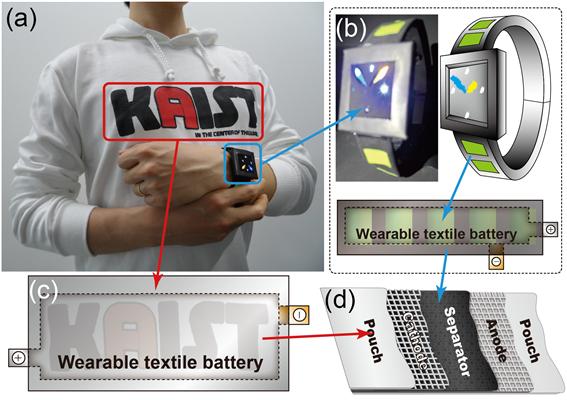 Technology Developed for Flexible, Foldable & Rechargeable Battery
Flexible, Foldable & Rechargeable Battery
The research group of professors Jang-Wook Choi & Jung-Yong Lee from the Graduate School of EEWS and Taek-Soo Kim from the Department of Mechanical Engineering at KAIST has developed technology for flexible and foldable batteries which are rechargeable using solar energy. The research result was published in the online issue of Nano Letters on November 5.
Trial versions of flexible and wearable electronics are being developed and introduced in the market such as Galaxy Gear, Apple’s i-Watch, and Google Glass. Research is being conducted to make the batteries softer and more wearable and to compete in the fast-growing market for flexible electronics.
This new technology is expected to be applied to the development of wearable computers as well as winter outdoor clothing since it is flexible and light. The research group expects that the new technology can be applied to current battery production lines without additional investment.
Professor Choi said, “It can be used as a core-source technology in the rechargeable battery industry in the future. Various wearable mobile electronic products can be developed through cooperation and collaboration within the industry.”
2013.11.21 View 11941
Technology Developed for Flexible, Foldable & Rechargeable Battery
Flexible, Foldable & Rechargeable Battery
The research group of professors Jang-Wook Choi & Jung-Yong Lee from the Graduate School of EEWS and Taek-Soo Kim from the Department of Mechanical Engineering at KAIST has developed technology for flexible and foldable batteries which are rechargeable using solar energy. The research result was published in the online issue of Nano Letters on November 5.
Trial versions of flexible and wearable electronics are being developed and introduced in the market such as Galaxy Gear, Apple’s i-Watch, and Google Glass. Research is being conducted to make the batteries softer and more wearable and to compete in the fast-growing market for flexible electronics.
This new technology is expected to be applied to the development of wearable computers as well as winter outdoor clothing since it is flexible and light. The research group expects that the new technology can be applied to current battery production lines without additional investment.
Professor Choi said, “It can be used as a core-source technology in the rechargeable battery industry in the future. Various wearable mobile electronic products can be developed through cooperation and collaboration within the industry.”
2013.11.21 View 11941 -
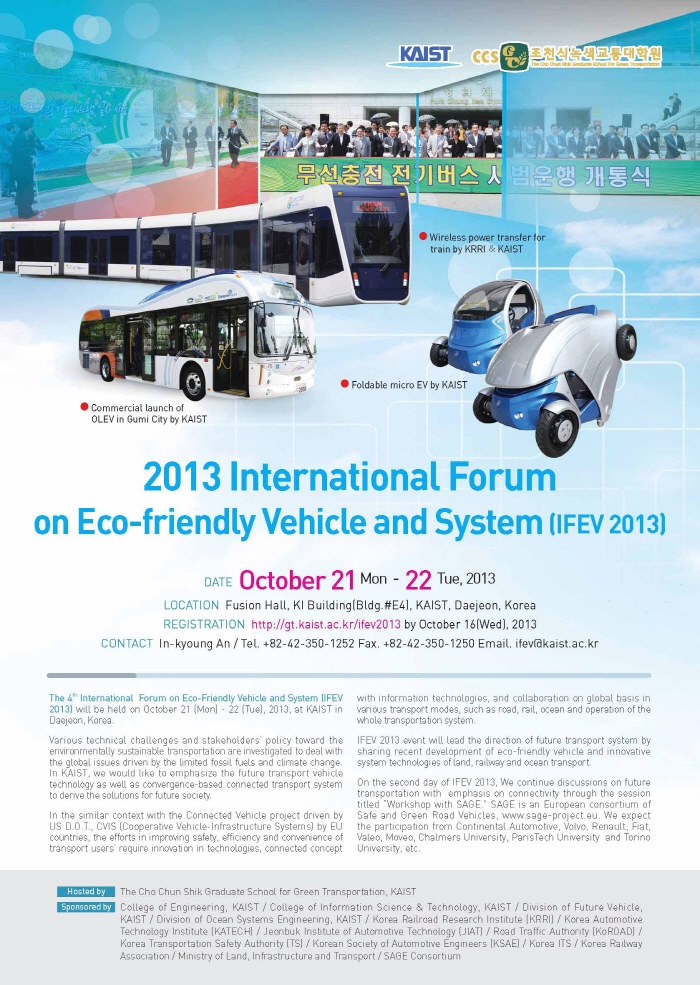 2013 International Forum on Eco-Friendly Vehicle and System
Leaders in transportation technology gathered at KAIST to discuss commercialization & standardization and to encourage the exchange of research progress, strategy, and future initiatives in transportation technology.
The Graduate School for Green Transportation at KAIST hosted the 2013 International Forum on Eco-friendly Vehicles and Systems (IFEV) in Fusion Hall of the KAIST Institute Building from October 21 to 22.
About 50 leaders in the field of future transportation from academic institutes and industries including Dr. Soon-Man Hong, President of Korea Railroad Research Institute (KRRI), Dr. Kwang-Hee Nam, Professor at Pohang University of Science and Technology (POSTECH), and Mr. Mike Schagrin, the Intelligent Transportation Systems Program Manager of the US Department of Transportation (retired) participated in the 4th annual IFEV.
The commercialization & standardization session and a technical session were followed by the plenary meeting of the forum.
Dr. Hong, the keynote speaker, introduced the High Capacity Double Deck High Speed Train, Near Surface Subway System, and Urban Railway System with Wireless Power Transfer Technology under the title “Korea’s Policy and Technology Initiative for Enhancing Green Transport Systems.”
Dr. Kwang-Hee Nam presented “Electric Vehicle Trends & the POSTECH E-Car Research Center Power Train Design,” followed by Mr. Mike Schagrin who spoke about “Going Green with Connected Automation.”
Dr. Omer C. Onar from the Oak Ridge National Laboratory (ORNL) shared recent research on “ORNL Development in Stationary and Dynamic Wireless Charging.”
In the commercialization session, Faical Turki of Vahle, Germany, presented “Wireless Inductive Battery Chargers,” and Professor Kazuyuki Ouchi from Tokyo University presented “Wind Challenger, the Next Generation Hybrid Vessels.”
In the technical session, presentations and discussions were performed on future ground vehicles and railroad technology, intelligent transportation systems and strategy, and policy on eco-friendly vehicle technology, including Professor In-Soo Suh of the Graduate School for Green Transportation at KAIST who presented on “Armadillo-T: 4WD Micro Electric EV with a Foldable Body Concept.”
On the second day of IFEV 2013, representatives of the European Union’s Safe and Green Road Vehicles (SAGE) consortium discussed connectivity in road transportation as a means of improving safety, efficiency and convenience in future safe and green vehicles with collaboration from Korean transportation organizations such as the Korea Transport Institute and Electronics and Telecommunications Research Institute.
Professor Suh, who organized the forum, said, “This forum will serve as an excellent opportunity to discuss and share R&BD progress in the green transportation field. “Details can be found at http://gt.kaist.ac.kr/ifev2013/.
2013.11.15 View 12731
2013 International Forum on Eco-Friendly Vehicle and System
Leaders in transportation technology gathered at KAIST to discuss commercialization & standardization and to encourage the exchange of research progress, strategy, and future initiatives in transportation technology.
The Graduate School for Green Transportation at KAIST hosted the 2013 International Forum on Eco-friendly Vehicles and Systems (IFEV) in Fusion Hall of the KAIST Institute Building from October 21 to 22.
About 50 leaders in the field of future transportation from academic institutes and industries including Dr. Soon-Man Hong, President of Korea Railroad Research Institute (KRRI), Dr. Kwang-Hee Nam, Professor at Pohang University of Science and Technology (POSTECH), and Mr. Mike Schagrin, the Intelligent Transportation Systems Program Manager of the US Department of Transportation (retired) participated in the 4th annual IFEV.
The commercialization & standardization session and a technical session were followed by the plenary meeting of the forum.
Dr. Hong, the keynote speaker, introduced the High Capacity Double Deck High Speed Train, Near Surface Subway System, and Urban Railway System with Wireless Power Transfer Technology under the title “Korea’s Policy and Technology Initiative for Enhancing Green Transport Systems.”
Dr. Kwang-Hee Nam presented “Electric Vehicle Trends & the POSTECH E-Car Research Center Power Train Design,” followed by Mr. Mike Schagrin who spoke about “Going Green with Connected Automation.”
Dr. Omer C. Onar from the Oak Ridge National Laboratory (ORNL) shared recent research on “ORNL Development in Stationary and Dynamic Wireless Charging.”
In the commercialization session, Faical Turki of Vahle, Germany, presented “Wireless Inductive Battery Chargers,” and Professor Kazuyuki Ouchi from Tokyo University presented “Wind Challenger, the Next Generation Hybrid Vessels.”
In the technical session, presentations and discussions were performed on future ground vehicles and railroad technology, intelligent transportation systems and strategy, and policy on eco-friendly vehicle technology, including Professor In-Soo Suh of the Graduate School for Green Transportation at KAIST who presented on “Armadillo-T: 4WD Micro Electric EV with a Foldable Body Concept.”
On the second day of IFEV 2013, representatives of the European Union’s Safe and Green Road Vehicles (SAGE) consortium discussed connectivity in road transportation as a means of improving safety, efficiency and convenience in future safe and green vehicles with collaboration from Korean transportation organizations such as the Korea Transport Institute and Electronics and Telecommunications Research Institute.
Professor Suh, who organized the forum, said, “This forum will serve as an excellent opportunity to discuss and share R&BD progress in the green transportation field. “Details can be found at http://gt.kaist.ac.kr/ifev2013/.
2013.11.15 View 12731 -
 KAIST's Partnership Agreement with the Imperial College of Science, Technology and Medicine, UK
KAIST signed an agreement on academic and research cooperation with the Imperial College of Science, Technology (Imperial College London) and Medicine in the United Kingdom (UK) on November 6th, 2013 in London.
The two universities have been implementing collaboration programs at the department level in the areas of plastic electronics since September 2012 and systems engineering and molecular simulation since February 2013, but have never had a formal partnership agreement.
President Steve Kang from KAIST and Provost James Stirling from Imperial College London signed the comprehensive cooperation agreement which will not only strengthen the existing collaborations between the two institutions but also explore areas of mutual interest in the interdisciplinary study of big data, as well as in the fields of mechanical engineering, synthetic biology, and quantum physics.
Workshops, seminars, lectures, and conferences will be jointly organized and held to facilitate the exchange of research staff and faculty and to promote collaborations in research assignments. The universities will also look into the possibility of exchange programs for undergraduate and graduate students.
The partnership agreement will be effective for five years.
Minister Moon-Gi Choi from the Republic of Korea’s Ministry of Science, Information and Communications Technology (ICT) & Future Planning attended the signing ceremony as well and congratulated the establishment of the partnership, saying:
“We are living in the age of highly advanced science and technology that requires us to have a new economic development paradigm for sustainable growth. Through convergence research based on the application of ICT and technology innovation, we will have new opportunities for development. I hope KAIST and the Imperial College London will be at the forefront of such endeavors in coming years.”With its history spanning over 100 years, the Imperial College London is a public research university located in London, UK, specializing in science, engineering, medicine, and business. The university is regarded as being one of the most prestigious universities in the world, having eminent alumni such as Thomas Henry Huxley (biologist), H.G. Wells (author), and Sir Alexander Fleming (pharmacologist).
From left to right: Provost James Stirling, Minister Moon-Gi Choi, and President Steve Kang
2013.11.12 View 9551
KAIST's Partnership Agreement with the Imperial College of Science, Technology and Medicine, UK
KAIST signed an agreement on academic and research cooperation with the Imperial College of Science, Technology (Imperial College London) and Medicine in the United Kingdom (UK) on November 6th, 2013 in London.
The two universities have been implementing collaboration programs at the department level in the areas of plastic electronics since September 2012 and systems engineering and molecular simulation since February 2013, but have never had a formal partnership agreement.
President Steve Kang from KAIST and Provost James Stirling from Imperial College London signed the comprehensive cooperation agreement which will not only strengthen the existing collaborations between the two institutions but also explore areas of mutual interest in the interdisciplinary study of big data, as well as in the fields of mechanical engineering, synthetic biology, and quantum physics.
Workshops, seminars, lectures, and conferences will be jointly organized and held to facilitate the exchange of research staff and faculty and to promote collaborations in research assignments. The universities will also look into the possibility of exchange programs for undergraduate and graduate students.
The partnership agreement will be effective for five years.
Minister Moon-Gi Choi from the Republic of Korea’s Ministry of Science, Information and Communications Technology (ICT) & Future Planning attended the signing ceremony as well and congratulated the establishment of the partnership, saying:
“We are living in the age of highly advanced science and technology that requires us to have a new economic development paradigm for sustainable growth. Through convergence research based on the application of ICT and technology innovation, we will have new opportunities for development. I hope KAIST and the Imperial College London will be at the forefront of such endeavors in coming years.”With its history spanning over 100 years, the Imperial College London is a public research university located in London, UK, specializing in science, engineering, medicine, and business. The university is regarded as being one of the most prestigious universities in the world, having eminent alumni such as Thomas Henry Huxley (biologist), H.G. Wells (author), and Sir Alexander Fleming (pharmacologist).
From left to right: Provost James Stirling, Minister Moon-Gi Choi, and President Steve Kang
2013.11.12 View 9551